LAKES BUSINESS

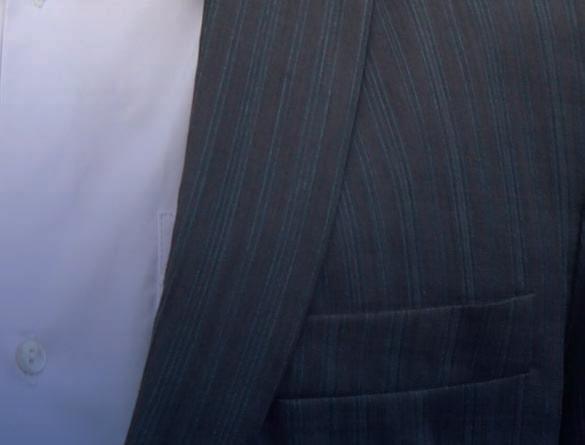

Issue 27 – March 2023


Carbon Zero by 2030
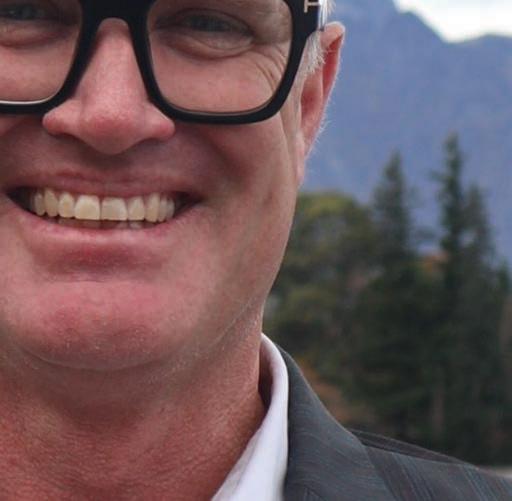
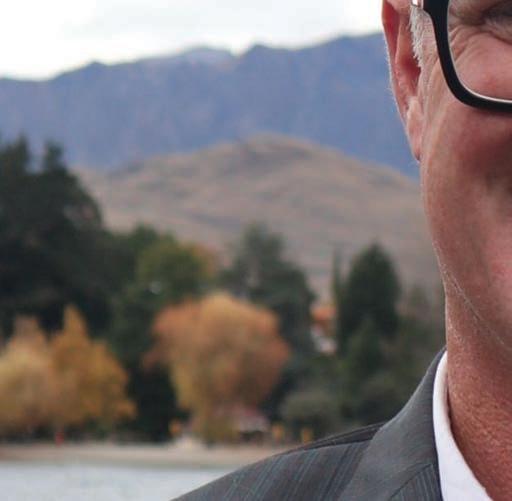

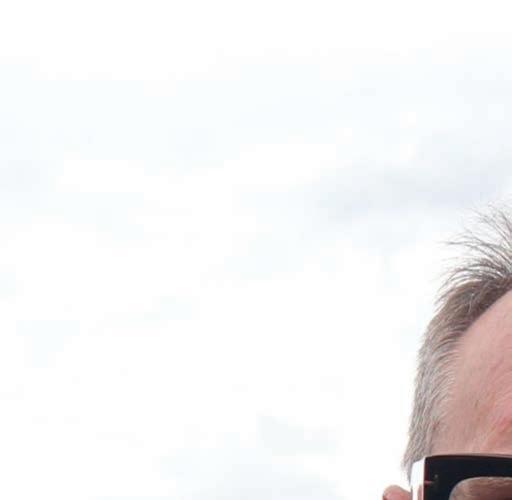
LAKES BUSINESS MONTHLY
SOUTHERN
Mat Woods
CE Destination Queenstown
e clock is o cially ticking on Queenstown Lakes’ grand plans to become one of the greenest tourist destinations in the world.
Destination Queenstown (DQ) and Lake Wānaka Tourism (LWT) have set the ambitious goal of making the visitor industry carbon zero by 2030.
at’s the keystone project of the new regenerative tourism strategy, contained within the 61-page destination management plan, which was developed over two years with Queenstown Lakes District Council (QLDC) and input from Kāi Tahu, the Department of Conservation and through extensive community consultation.
It was endorsed by Queenstown Lakes councillors last month, setting the goal in stone.
Visit the DQ website and you’ll nd an actual countdown. As Lakes Business went to press, there were 2868 days, 21 hours, 45 minutes and 43 seconds remaining.
“ e clock is slightly scary but it’s a good thing every day to ask the question ‘what have we done today towards achieving the goal?’, says DQ chief executive Mat Woods.
“It is a reminder that we need consistent action, we need to keep moving in the right direction to get there. If we’ve done nothing, well, that’s not great.”
Woods says he’s been “blown away” by the response from DQ members and the community since the plan was rst aired in November.
“When we were socialising the idea, there was de nitely an awkward silence when we announced the goal. But that silence was ‘now we’re going to do that, that makes sense’. at’s been pretty much the feedback. I haven’t heard anyone say ‘don’t do it’. It’s been supported.
“Now the biggest piece of the puzzle is how, how we do it.”
A dedicated team, which includes QLDC Climate Action Programme Manager Katherine Durman,
Countdown to carbon zero
by Paul Taylor
local energy expert Dr Stephen Batstone, and consultants from Destination ink, has already begun macro scoping of the carbon zero plan.
ey’re looking at the current state and possible solutions, quantifying the district’s emissions and potential solutions, including tech. e scoping report is due by the end of this month.
“We begin by setting out what we know, and what we don’t know. For example, what technology is available that you could actually implement, and on what timeframe,” Woods says.
e plan – titled ‘Travel to a thriving future’ –contains far more than the carbon zero goal. It has 23 key projects, from decarbonisation and promoting biodiversity to zero waste and pollution, emergency and climate adaptation preparedness, and developing arts, culture and heritage.
e rst initiative, launching in early April, will be a funding platform which enables visitors and industry to support localised climate, conservation and biodiversity action. But how realistic is the plan, both as a whole and the headline carbon zero push? e aim is for net carbon zero – so no o setting by buying carbon credits.
Pii-Tuulia Nikula is a principal academic at Te Pūkenga, New Zealand Institute of Skills and Technology (EIT campus). She is also a cofounder and a board member of the Climate Action Network for International Educators (CANIE).
As part of recent research, Dr Nikula interviewed 13 businesses in Aotearoa New Zealand, who had made a voluntary commitment to reduce their emissions.

“It was a values-based argument for a lot of the businesses I spoke to, in that the directors or owners felt strongly about climate action,” she says.
“ ey were quite sceptical about whether other
businesses would want to do the same, as they felt they would be still in the usual mindset.
“Will it be the same in Queenstown and how do you engage those other businesses? I’m sure a lot of the small to medium-sized businesses will have a lot of other challenges as well, especially just day-to-day operations.”
ose businesses that are willing and able to go on the journey will still face challenges.
“ e important thing will be to have support, because a lot of the businesses, at the start, didn’t really know how to count their emissions.
“It’s not rocket science, but it’s not necessarily something you know, or want to spend days and days to nd the information gure out. ere has to be help and support systems in place.
“And for some businesses, once they’d taken the low-hanging fruit to reduce emissions in the rst couple of years, at some point they became a bit stuck. ey felt they were as e cient and lean as possible.”
e good news, Dr Nikula says, is that those businesses that did make the change found they had positive engagement from sta , although extra training was required.
“If you look at something like trying to reduce your waste, then all the employees need to know what they’re doing in terms of recycling, the A, B and C.”
And being environmentally conscious can be a win-win for many businesses.
“Quite a few found as they reduced their emissions, they reduced their costs too.
at might be a hotel that asked guests if they want their towels washed every fourth day instead of every day, or businesses that cut down on single-package items.”
For some Queenstown businesses, such as ight-seeing and aviation businesses, alternative technology vehicles might not be available by 2030, or not at a reasonable price.
“ ey might be trying to make a change but it’s
March 2023 | Issue 27 LAKES BUSINESS
beyond what they’re able to do, so it’s more this question of ‘do we want to exist or just close our doors?’

“Hydrogen and electric planes are being tested, but they’re not there yet.”





































at’s especially true of airline jets, and Queenstown Airport boss Glen Sowry, speaking at the launch of the plan in November, said the industry wouldn’t be carbon zero by 2030. at means the carbon expended by visitors arriving will need to be mitigated in some way, as the plan includes Scope 3 emissions. But, in Queenstown itself, even businesses that celebrate the roar of the petrol-powered combustion engine are investigating changes. Shotover Jet has already developed and launched an electric jetboat, which will eventually replace those powered by the twin 350-horsepower V8s. And Gibbston’s Oxbow Adventures, which operates gloriously muddy o -roaders and jet boat sprints, along with clay bird shooting, is also already taking tentative steps along the carbon neutral path.
Managing director David ‘Darb’ Richmond says: “For the last couple of years we’ve been talking about an electric jetboat, it’s something we want to do.
“It means we can put it in closer to cities, in other places around the world, as you get rid of all that noise.





“But that’s still a few years away. Our biggest problem is we use lots of power in short bursts, so recharging fast enough is an issue. But the engineers we’ve spoken to say that space is developing fast, so in the next couple of years there’ll be some exciting technology.”
e o -roaders could also be electric powered in the future, although mud and moisture in winter could pose di culties.
“I had a good chat with Hayden Paddon when he came out here, about what he’s doing with electric rally cars. It’s pretty exciting stu and would work well for what we’re doing because it produces more power than our petrol combustion engines, but I don’t think the technology is quite there for our application just yet.”
R&D and eet replacement are expensive, however, and 2030 is only seven years away.
“It’s close but in the short term, we are working with a company to see how we can become carbon neutral. at would mean o -setting, planting natives to o set every tonne of fuel.”
Oxbow planted 15,000 natives when they moved onto the Gibbston site, but has looked at planting elsewhere to o set, in a more forgiving climate than the hot, dry Central Otago.
MEET THE FAMILY LAW TEAM



e idea that Queenstown should be able to o set or capture carbon only within the con nes of the district will be one of the greatest challenges.

“Quite o en when you see plans like this, they are based on businesses or organisations being able to pay to o set,” Dr Nikula says. “But Queenstown wants to hit carbon zero without o setting elsewhere, so that obviously makes it quite ambitious.”
Another challenge could be the alignment of local initiatives with international brands, such as the many hotels, not to mention retailers, if they are counted as visitor economy.
But Novotel boss Jim Moore, who’s also on the DQ board, says many companies are already making changes.
“Our goal is to be carbon zero by 2050, rather than 2030, so we’re not carbon accounting just yet but we are on the path,” Moore says. “ is pushes you along a bit. I can’t talk for every international hotel company but ours seems fairly well aligned and recognises the need to move in that direction.
“If you don’t start down the road, you’re never going to get there.”

March 2023 | Issue 27 SOUTHERN LAKES BUSINESS MONTHLY
Mat Woods (CE Destination Queenstown), Michelle Morss (QLDC Strategy and Development Manager) and Tim Barke (CE Lake Wanaka Tourism) leaving Council just after the unanimous vote
Queenstown Office: Level 2, Craigs Investment Partners House, 36 Grant Road, Queenstown Wanaka Office: Level 1, 78 Ardmore Street, Wanaka
Dr Pii-Tuulia Nikula, co-founder and board member of the Climate Action Network for International Educators (CANIE)
021 568 315 | 03 441 2743 louise.denton@toddandwalker.com
CONTACT US
Providing specialist advice on family matters: Relationship Property, Contracting Out/Prenuptial Agreements, Separation, Family Violence, Protection Orders, Care of Children, Guardianship, Dissolution of Marriage, Oranga Tamariki Proceedings and PPPR Act Proceedings.
Doing the right thing
by Sara Irvine, General Manager Sustainability and Corporate Affairs, Queenstown Airport


e recently announced carbon zero 2030 target for our district is bold, and it’s proven to be unifying. e impact of climate change is right in front of us and a collective response is required. We support the goal to become a regenerative tourism destination and are working with the Queenstown Lakes District Council, Destination Queenstown, Lake Wānaka Tourism and other partners towards this.
Over the past two years, we have thought deeply about our role as an important infrastructure asset. e airport connects our home with the rest of New Zealand and the wider world, is a signi cant contributor to the region’s social and economic wellbeing, and is an essential lifeline utility.
Our vision is to be an innovative airport that people love to travel through and the community takes pride in.
As a Council Controlled Trading Organisation, we also have a responsibility to run a pro table business, generating dividends for our shareholders, and to provide resilient infrastructure that ensures residents and visitors alike have a great experience when travelling through ZQN. Our region has one of the fastest-growing populations in the country. An excellent air transport network helps ensure it is a vibrant and liveable place.
e challenge is balancing our activity with the shi s necessary to address climate change and to preserve what makes our region so special.
We’ve made it clear we are not planning for limitless growth and have committed to operating within our existing air noise boundaries for the next decade. is was a key element of our 10-year Strategic Plan.
is is a signi cant and timely commitment because it a ords us the opportunity to create a shared vision for the future.
We are on the precipice of global changes to aviation as the focus on decarbonisation and innovative technology escalates. It is, therefore, an opportune time to be developing a Master Plan for an airport that is future-ready and continues to contribute to the social and economic wellbeing of the region over the long term.
Carbon-zero air travel is not yet a reality and we will be reliant on advances in aircra technology and alternative fuels to eliminate aviation emissions.
In the dra Master Plan, which will be ready for public consultation mid-year, we’ll be proposing that space is reserved for a precinct to support sustainable aviation. is could accommodate alternative fuel and energy sources such as hydrogen and make provision for electric aircra . Air New Zealand is committed to having electric aircra in its eet by 2030 and electric regional air travel will signi cantly reduce carbon emissions.
We’ve put a lot of e ort and thought into our Sustainability Strategy and decarbonisation targets. We’ve committed to certi ed renewable energy supply across the entire airport, including ending the use of a diesel generator for supplementary power during periods of peak demand.
We are a member of Toitū Envirocare’s environmental management programme and are on track to achieve carbon neutral certi cation for QAC’s operations in this nancial year. In coming years, we will progress to global benchmarking with the Airport Carbon Accreditation programme.
We have installed an energy-e cient heating and ventilation system, provided public electric vehicle chargers, and established a composting programme for all organic waste from the airport terminal.
Waste is a signi cant contributor to the airport’s emissions and we began this year with a big resolution – to make 2023 the year we eradicate single-use co ee cups from Queenstown Airport. If you don’t think this will make much di erence, 7,000 single-use cups a week were sent to land ll from ZQN in 2019. Over a year that adds up to a mountain of rubbish. You can help by travelling with a reusable cup, buying or borrowing a reusable cup, or taking a break and sitting down with your drink.


We hope this campaign triggers a ripple e ect and supports the carbon-zero goal by encouraging visitors and residents alike to travel lightly and reduce waste. is month we launched an airport-wide ZQN Sustainability Pledge, which includes people, planet and prosperity linked commitments.
e challenge is signi cant and there’s a lot to do to become a regenerative tourism economy, but incremental steps add up. We have an opportunity to create a collective movement that enhances everyone’s quality of life.
Flying into Queenstown is always a spectacular experience. We know what a privilege it is to live in such a remarkable place. Put simply, we are determined to do the right thing.
March 2023 | Issue 27 LAKES BUSINESS
Aviation
Sara Irvine
More, not less, is the key to carbon zero
Real NZ’s mission is to get people closer to nature, transporting visitors to New Zealand’s unique landscapes and outdoor experiences. While this kind of tourism can inspire awe and love for nature, it can be a heavy polluter that threatens the very landscapes it celebrates.
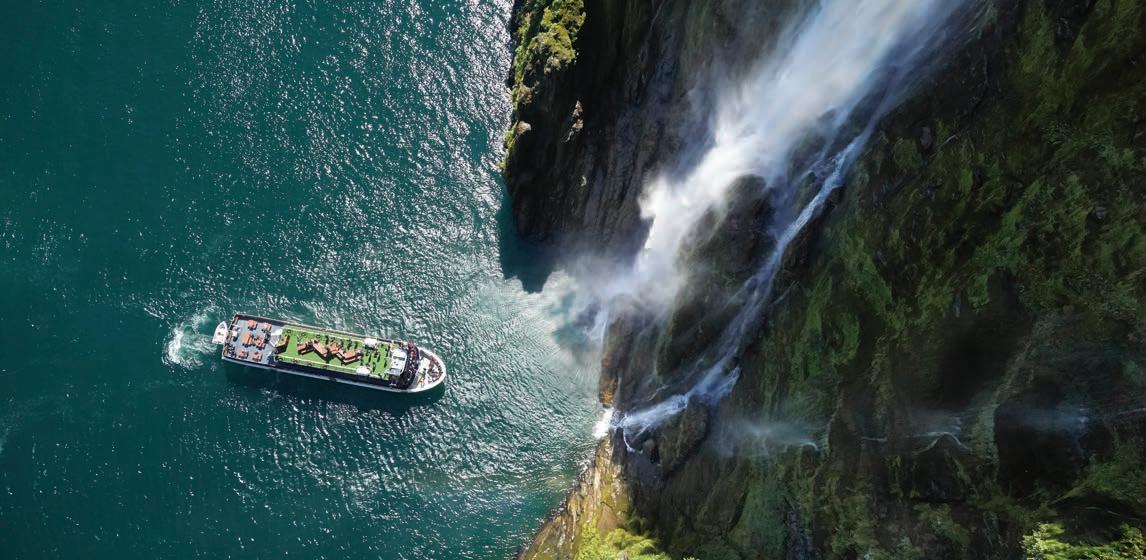
e team at Real NZ understand this and over the past few years, they’ve been working hard to transform tourism. ey’re right behind the region’s ambitious but important goal to be carbon zero by 2030.
Ewan Mackie, ski area manager of Treble Cone and Real NZ’s sustainability lead, says achieving carbon zero is not about doing less, it’s about doing more.
“One of the rst things to do is to understand the scale of the challenges and the scale of the opportunities – as in, where do we have room to reduce and where do we have room to move?”
Last year, Real NZ completed their rst full independent accreditation through Toitū Envirocare. is gave Real NZ a clearer understanding of their carbon emissions.
“We’re on a carbon reduction programme with Toitū now and this has enabled us to have an indepth, granular look at what our major sources of emissions are and how they stack up against each other and across the whole operation.
“[…] it’s that old adage: you can’t understand what you can’t measure. We’ve got to have a really good understanding of what our carbon footprint is because that enables us to take e ective action and measure our progress.”
Mackie says the team were aware they have some
by Bethany Rogers
very visible sources of emissions like the coalburning TSS Earnslaw and the diesel-burning buses which take guests to remote natural landscapes.
It was no surprise that Real NZ’s biggest carbon challenge would come from their traditional heavy modes of transport, but by measuring their carbon emissions, Real NZ now has a much better idea of how that all stacks up when compared to the number of people they’re transporting or how that transport mode is used.
Less obvious was the company’s use of electricity in its o ces, workshops and other buildings.
“ is highlighted many opportunities to reduce. We have a large carbon footprint through our electricity use. e ski elds, Cardrona and Treble Cone use a massive amount of electricity. And even though New Zealand has a lot of green hydro, right now the country has an energy shortfall and that’s currently being met with Indonesian coal and Huntly Power Station.
“It’s easy to focus on the Earnslaw burning coal and the buses burning diesel – but there are other major sources of emissions that warrant our attention.”
e process has pro ered some low-hanging fruit for Real NZ. e team have already worked hard to reduce waste to land ll, which contributes heavily to greenhouse gas emissions (this is also measured in carbon emissions accounting).
ey’ve looked at how operations are structured, to ensure everything is operating as e ciently as possible (for example running buses at capacity), and are investing in engineering work and refurbishments to make sure they’re getting
maximum e ciency wherever possible with their current operations.
Mackie says Real NZ has social and nancial sustainability to think of too – so it’s not about doing less, it’s about doing more to push for change and seize new opportunities.
“To get to carbon zero, we’ll need large-scale technological change, some of which just isn’t there yet. But we’re working towards those changes. So another low-hanging fruit was getting our mindset ready, making a shi in attitude.
“One of the headwinds is lobbying regional and central government and larger supply partners to enable access to alternative fuels and to accelerate new technologies. We’re positioning ourselves as a company to say: hey, look, we’re willing to be an early adopter, we’re willing to give things a try, and to invest.”
Mackie highlights the carbon accreditation as being key to Real NZ’s strategy, enabling the team to focus and be ambitious and strategic in cutting their emissions. As for Carbon Zero 2023:
“We support the bold ambition. To achieve New Zealand-wide carbon zero by 2050, we need to be ambitious. We need to bring that forward – hence 2030 for our regional and tourism. We need to lay down some markers and commitments and this will be a key ingredient to bring through innovation, to bring through investment, to unlock capability, which will then help us meet our goals.
“So the classic question: can we be carbon zero by 2030? We absolutely can, if we keep with this ambitious trajectory.”
March 2023 | Issue 27 SOUTHERN LAKES BUSINESS MONTHLY
Tourism
Sustainably racing to the future
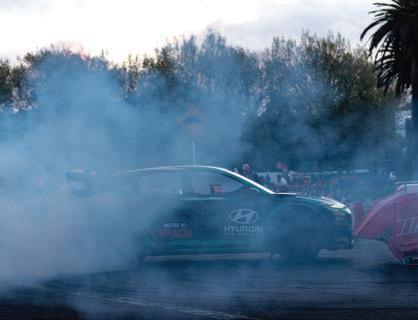 by Jess Allen
by Jess Allen
Cromwell-based rally driver Hayden Paddon is pioneering new technology in the industry. As the World Rally Championships look to allow battery-powered vehicles in the future, Hayden’s company, Paddon Rallysport Group, have developed a fully-electric rally car – one of only two in the world.


Paddon Rallysport Group worked alongside Stohl Advance Research and Development (STARD), an auto-racing team founded by Australian racing driver Manfred Stohl. ey also worked with the University of Canterbury to come up with the vehicle and embarked on the project in 2019.
Hayden’s a strong pillar in New Zealand motorsport – he was PWRC World Champion in 2011 and won the New Zealand Rally Championships in 2008, 2009, 2013, 2018 and 2021. Paddon Rallysport Group are currently working on several projects, but their key focus is electri cation. e idea was rst sparked by Hayden four years ago.

“I came back to New Zealand four years ago, back from competing overseas professionally. I came back with a real re in my belly to go back and excel for the Kiwi team – trying to look at the crystal ball, if you like, for what the sport was going to look like moving forward,” explains Paddon.
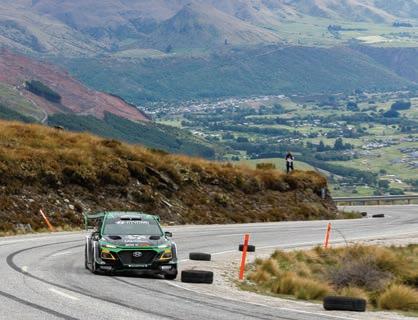
“We needed to try and have a point of di erence as a small team on the other side of the world. It was clear that we had to adapt new technology that hasn’t been seen in our form of motorsport before.
So there was an opportunity to stand out from the crowd,” says Paddon. When the team rst started the project, it seemed as though it was a little bit too early, but over the space of the next few years, while they were building and developing the car, the industry sped up quickly and caught up. While they once felt ahead of the curve, they now feel as though the timing is perfect. One of the main questions they’ve focused on during the project is how can they make the technology work in an extreme environment.
“ e EV rally car is our main agship and within that, we’re learning a lot of IP and a lot of tech. We’ve got a lot of really good technicians and engineers here – we’re using that as our platform to become electri cation experts. at will then cross over to what we’re doing with EV conversions on classic cars – looking at how we take the electri cation to a whole other level, which involves the electri cation of more race cars and more motorsports. Speaking for us, we’re in a sport where we need to be going fast – we’re in a performance-driven environment but we’re
also about trying to bring the cool into EV.
“ ere’s a persona around EV that it’s boring, slow and quiet – all that sort of stu . We’re in a position where we can try and counter some of those arguments and actually showcase that EV doesn’t necessarily mean boring or dull. It’s pretty clear the automotive industry is changing and if we’re racing around in combustion cars in ve or ten years’ time then that’s the equivalent of big car manufacturers selling electric cars and we’re racing horses in comparison, so it just becomes irrelevant.
“We have a responsibility in that sense for us to grow and survive. Motorsport is generally an avenue where a lot of manufacturers, and us in the tech space, develop the technology. We develop it in a high-pressure environment – you make it work in a public arena and then all of the sudden you’ll see how all that will trickle down into road cars to enhance the experience of everyone’s car. Our sport needs to be ahead of the curve to have a place within the automotive industry,” says Paddon.
So far, the car has been raced within New Zealand and it’ll soon go across the ditch to Australia to do a demonstration there. Of the ve events the car has competed in, it’s won four of them and Hayden says it’s one of the most exciting cars he’s ever driven.

March 2023 | Issue 27 LAKES BUSINESS
Hear more from Hayden Paddon at the Queenstown Chamber of Commerce’s Business and Banter event on Friday, 17 March, 12–4pm at QT Queenstown, 30 Brunswick Street. More information is available online at events.queenstownchamber.org.nz
Automotive Images by James Allan
Ski fields working towards regenerative visitor economy

Queenstown and Wanaka ski elds are on board with the Queenstown Lakes Regenerative Tourism Strategy, which includes the Carbon Zero 2030 goal. Real NZ and NZ Ski are both supporters of the initiative and have engaged in sustainable and environmentally friendly practises for several years.
e project, which was recently given the green light, will dictate the next seven years for the region’s visitor industry.
e Regenerative Tourism Strategy: four key approaches
1. Mitigate emissions by deploying existing clean-energy solutions, fostering more rapid innovation, and accelerating the adoption of existing technology
2. Evolve marketing plans and in uence partner organisations to change the business mix, attracting market segments with a lower carbon intensity and a higher value
3. Evolve marketing plans and in uence partner organisations to change the business mix, attracting market segments with a lower carbon intensity and a higher value
4. Invest in carbon removal on the path towards decarbonisation for di cultto-abate emissions in line with Oxford Principles
Queenstown Lakes’ ski elds will be among some of the most di cult businesses in the region to successfully operate at carbon zero, but they’re looking forward to the challenge.
e team at Cardrona and Treble Cone (operated by Real NZ) have had a strong commitment to regeneration and lowering their impact on the environment whilst also looking at community outcomes for many years now. CEO of Real NZ, Stephen England-Hall, says the team are always looking at ways to be more e cient and e ective and to use fewer resources – they’ve eliminated single-use cups and plastics.
“Some of the things we’re already doing is our commitment to zero waste to land ll, which we started a couple of years ago – that’s had a signi cant impact on our footprint. We also have a programme called Ride Tamariki, which
by Jess Allen
is about getting kids onto the mountain and into snow sports, even those kids who may not be able to a ord it – it’s been hugely successful and engaging, and is supporting the community. For us, that’s a really key part of regeneration –making sure that we’re giving back more than we take.
“We’re doing a lot more around the regeneration of habitat, so a bit of planting and making sure that we’re restoring our natural environment around our ski resorts, whether that be re-establishing beech or replanting tussock, or looking a er the water systems and things like that. ere’s quite a bit of work that goes on across those mountains in terms of how we think about regeneration,” says England-Hall.
Both NZ Ski and Real NZ agree that the project can seem overwhelming at times but that it’s a great initiative and they’re excited to work towards it – the best way to do that is to break it down into smaller steps. While Real NZ foresee electrical supply being a potential challenge in reaching the goal, Paul Anderson at NZ Ski believes having their grooming eet producing zero emissions could be their biggest challenge –but not impossible by any means.
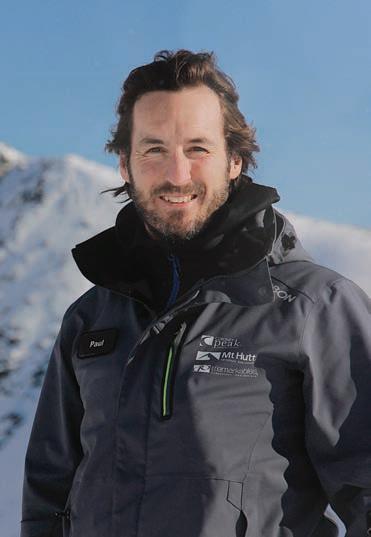
“Sustainability is critical to the ski industry and climate change is always foremost in our minds. We’ve been focusing on that with a real lens on
sustainable development for quite a number of years. We’re privileged to operate on public conservation land and one of our visions is to make sure those places that we operate are actually better for us having been there than they would be without us.
“ e kind of initiatives we’ve been focused on over the past years environmentally – we’ve got extensive native planting and revegetation programmes on all the mountains, as well as weed control (including the eradication of wilding pines).
“We really embraced the Predator Free objective that came out about ve years ago –we’ve got monitored predator trap lines on all our mountains. In terms of our scope three emissions, we’ve got a lot of people travelling to the mountain and we’ve continued to expand our public transport o ering – encouraging people to get out of their vehicles and onto public transport or carpooling,” says Anderson.
NZ Ski will also work to continue to upgrade li systems and introduce more e cient snowmaking methods.

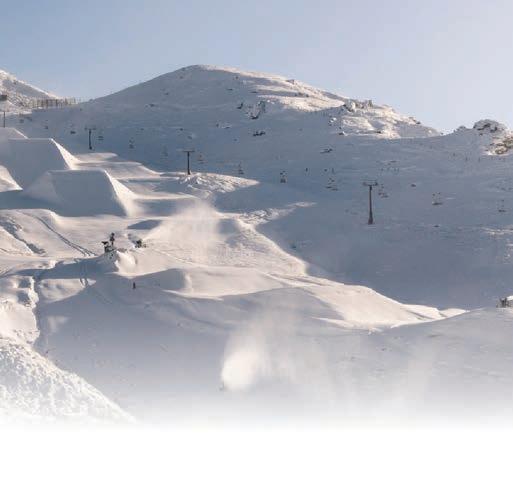
ere’s still a lot of work to do on the journey towards carbon zero by 2030, but our region’s ski elds are enthusiastic and looking forward to being involved in the ideas, discussions and actions towards making it happen.

Tourism March 2023 | Issue 27 SOUTHERN LAKES BUSINESS MONTHLY
Paul Anderson, CEO of NZSki
Stephen England-Hall, CEO of Real NZ which operates Cardona ski area
Business insights with Trent Yeo
Ziptrek Ecotours NZ executive director Trent Yeo is one of the godfathers of Queenstown’s sustainability movement and has been planting trees, both metaphorically and physically, for more than 14 years.
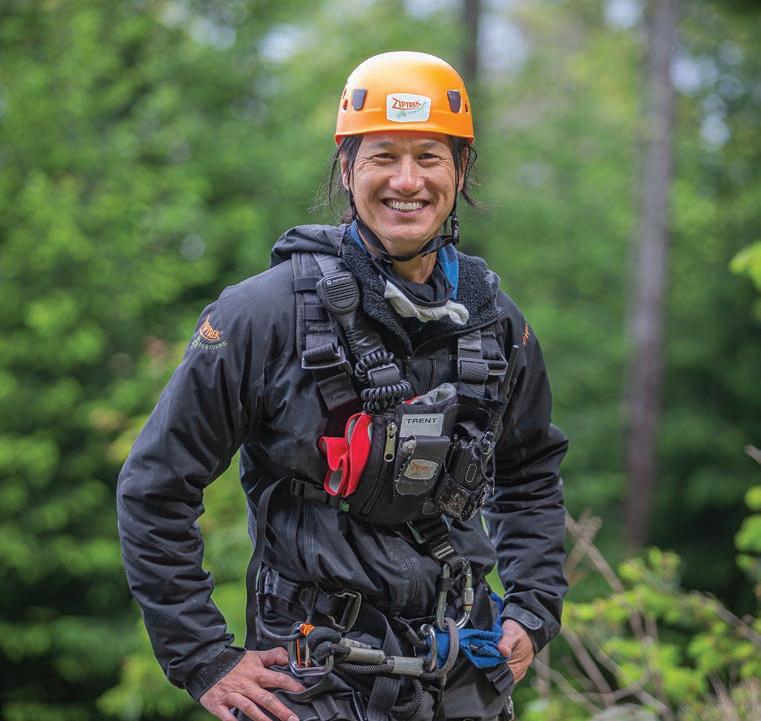
e ecotourism business was founded in Canada’s Whistler resort by Charles Steele and David Udow in 2001. Yeo worked there and in 2009, he partnered with them to bring the experience to Queenstown.
It o ers customers a shot of adrenaline and adventure as they y between treehouses on Bob’s Peak, combined with education about nature. e company is also walking the walk. It is Queenstown’s rst carbon-neutral tourism business, has planted more than 6000 native trees in the forest where it operates, implemented a pest control programme, and also sponsors various charities and environmental initiatives, including the reptile wing at Kiwi Birdlife Park. As such, it provides a microcosm of where Queenstown Lakes’ new destination management plan hopes to take its visitor economy – a decarbonised, sustainable industry which celebrates and enhances the region’s natural environment.
Even Yeo says he was “unsettled” by the scope of the plan, however.
“But that’s the point, right? e situation itself is unsettling,” Yeo says.
by Paul Taylor
“We don’t really have a choice. When it comes to climate change, we actually have to do everything we can do, we have to throw the kitchen sink at it.
“We’re going to shoot over 1.5 degrees and we’re already watching the world change around us. A whole range of things are happening at a greater rate and with more force than before, look at the scienti c data, or the oods in Auckland.
“ is is the only sensible thing to do.”
Yeo says businesses now won’t just have to act due to lo y altruistic goals, but rather as a necessity to protect their bottom line.
“Tourism signi cantly operates within the constraints of weather, so imagining we might have to stop operating for 10% of the year is now a real scenario,” he says.
“My partners in Canada allow for days they don’t operate in the peak of summer due to re risk. It becomes part of your economics, whether it’s re, oods, storms or wind.
“ e West Coast constantly gets smashed, for example. And that leads to insurance. If you can’t get insurance, you can’t be in business.”
Queenstown’s plan will help locals get ahead of the game, especially as greenhouse gas reporting becomes a national requirement.
But some will nd the change easier than others. Ziptrek has won numerous environmental tourism awards, but environmental consciousness
is part of its makeup, aligned with the brand from the beginning.
“Other businesses will need to make a psychological state change, then express that to their stakeholders, shareholders, partners, etc. It is an interesting process to go through.
“Even for us, when we did our rst carbon tracking and got certi ed four years ago, I can tell you I had a lump in my throat when I got the data back to con rm whether or not we were a low carbon user.”
Ziptrek measures its carbon impact from business activity, including fuels, vehicles, electricity, waste to land ll, freight and business travel.
In FY 2018/19, its initial benchmark year, it was estimated to have produced 42.56 tonnes of CO2e (carbon dioxide equivalent). e average Kiwi produces 17.4t per year.
By 2021, it dropped to 11.15t CO2e due to various reduction initiatives, including switching to a 100% renewable, carbon-neutral energy provider. “ e people who supply us with goods are used to questions from us about supply chain management, how far things have come, and all that sort of stu .
“ ose are the questions everyone will need to ask of their suppliers and the people they work with.”
e carbon Ziptrek does produce is o set by purchasing certi ed carbon credits that support indigenous forests in Aotearoa. Ziptrek supported Kānuka Hill – Uruwhenua Native Regeneration Project near Golden Bay last year.
But even that, under the strategy, will be discouraged in favour of local carbon capture planting projects, allowing Queenstown Lakes to be truly carbon zero.
Yeo likes the idea of a Travellers Forest, whereby visitors partially o set their own carbon by planting a native tree in a new Queenstown forest, among other ideas.
In general, he just feels a sense of relief that the work of the likes of the Wao Summit, Sustainable Queenstown and Wānaka, Mana Tāhuna, the Trails Trust, Lightfoot Initiative, Action for the Climate Emergency and others is now becoming mainstream.
“I’m an optimist but I never believed we’d get to the point so quickly where we had important people on the same page about climate change and regenerative tourism.
“A lot of system change will take place in the next ve to 10 years, for example, the charging infrastructure and hydrogen production, distribution and access. e seven years [to 2030] is just long enough to do the big stu but close enough for people to get red up about it.
“I’m red up about it. It’s this tension of having just enough time to do something really big.”
March 2023 | Issue 27 LAKES BUSINESS
Tourism
Success with fossil fuel-free cherries
He may have raised a few rural eyebrows when he launched what’s believed to be the world’s rst zero fossil fuel orchard in 2019, but Central Otago’s Forest Lodge Orchard and NZ0 founder Mike Casey is already seeing dividends.
Casey sold his successful so ware business, Grad Connection, to the HR and employment website Seek in 2019. With his wife Rebecca, a senior nancial controller, the Wellington-raised pair le Sydney and the corporate life behind to live in New Zealand.
“I had no idea what I wanted to do, but we wanted to move back home and I wanted whatever I did to reduce climate change,” says Casey. ey bought 9ha just north of Cromwell and planted 5.8ha in cherries in a bid to produce zero fossil fuel cherries.
“It was probably the rst farm we had set foot on.” eir 25kms of trees are now producing 9300 cherries that are already fetching a premium on the local and international markets.
“Last year we produced a small two-tonne crop and this year eight tonnes, 90 per cent of which was exported. Next year we hope to produce 30 to 40 tonnes.”
By summer 2026-27 they’re aiming to produce 80,000 kilos of fossil fuel-free cherries.

“ is is not about o setting carbon, but eliminating fossil fuel use, avoiding all emissions on the farm,” says Casey, “I think consumers will appreciate the systemic changes in our farming behaviour.
“It’s been a bit overwhelming, the logistics of what we’ve unleashed. We put up a pre-order before the cherries were ready on our NZ0.com website and they sold out quickly.”
NZ0 will eventually be used as a certi cation brand and showcase for any other like-minded producers wanting to tap into what Mike believes will be a highly sought-a er concept moving forward.
“NZ0’s our consumer brand and we hope others will join, building a brand synonymous with no fossil fuels, that’s reliable and trustworthy and can’t be greenwashed,” says Casey.
ere will be no need for marginal carbon credits from overseas, o sets or trade-o s in this allencompassing start-up as there will be complete trust, he says.
by Sue Fea
“People told me the consumer wasn’t prepared to pay a premium for fossil fuel-free food,” he says, “But we’ve already proved you can achieve a 15 per cent premium on the domestic market and we expect a 20 per cent higher price at export. It’s a green premium.”
ere was nothing in place to support growing an orchard, 100 per cent electric, so he had to create his own certi cation.
“If a farmer can use our certi cation to make more gate returns with zero fossil fuel then we both win.
“ ere’s no need for credits when there’s no fossil fuel used. We’re taking a traditional business like farming and electrifying it.”
e certi cation system was designed, with help from the government’s AssureQuality, to create their own zero fossil fuel food standard.
New Zealand has one of the most highlyrenewable electricity grids in the world, using solar, wind and hydro. Forest Lodge powers through batteries and solar power but connects to the grid when necessary.
Casey’s written a so ware programme and through this, he only connects to the national grid when power is cheap.
“ at almost always means it’s entirely renewable and there’s an abundance of power. When the power’s expensive that usually means it has a
large fossil fuel component, produced using coal and gas at Huntly,” he says. Any excess power he sells back to the national grid.
He’s imported New Zealand’s rst electric tractor from the US, due to arrive in the next month or so. Casey also uses two electric golf carts, a home-built electric tractor and sprayer, and the country’s largest electric ride-on mower and is in the process of converting a 1990 Toyota Hilux to electricity. e family runs two family electric Hyundai vehicles.
“We’re doing it because you either answer to climate change, change it, or ignore it, go into a tailspin worrying about it, or do something about it.”
Casey’s nding overseas customers are more advanced and aware of an environmental impact than Kiwis, which is why they’re willing to pay a premium on supermarket shelves.
While Forest Lodge has already won a Sustainable Energy of NZ Association award for Best Hybrid Grid Connection, awards are not what it’s all about.
“We’re looking for farmers and growers who are embracing change because climate change is coming, whether we like it or not.”
Sweet solutions
Moves are afoot in Central Otago to put the multitude of fruit food waste from its many plentiful orchards to good commercial use.
Central Otago District Council economic development manager Nick Lanham says several council-led reports have explored the options for commercial processing of any ‘seconds’ fruit that’s usually discarded.
e council’s hoping that orchardists in the region will collaborate together with processors and come up with a suitable solution to commercialise fruit waste.
Some ideas include fruit juices, freezing the fruit, either for processing in future or to sell at supermarkets in bags, freeze drying or extracting the health properties from fruit.
“It’s something that lends itself to a local focus to keep transport costs down,” says Lanham.
“ e next step will be to facilitate conversations with a number of potential investors and band together so we can get more processing happening locally,” he says. “It’s the way the world’s going. We’ve got to be looking to make the most of everything we produce, considering the precious resources that go into growing it.”
March 2023 | Issue 27 SOUTHERN LAKES BUSINESS MONTHLY
Horticulture
Accommodation
First off the blocks
by Sue Fea
Hilton Queenstown has been rst o the blocks, in the hotel chain’s Australasian region, to provide carbon neutral meetings to clients. Environmental initiatives are not new to the global chain, which has high targets amid the calls for New Zealand to be carbon neutral by 2050.
“We’ve been tracking and measuring our energy, water usage and waste since 2008 so we’ve been involved with this for a long time,” says Hilton
job to be the catalyst for change and inspire them to prioritise their environmental impacts,” he says.
“Statistics show that almost 80 per cent of businesses overseas now have their own sustainability programme, or sustainability team, and 55 per cent of them measure the environmental impact of their business travel,” says Ehmann. While it may mean businesses not actively trying
to o set carbon emissions may be overlooked, Ehmann says for Hilton Queenstown it’s more about remaining in line with its values.
“We simply don’t want to pollute this beautiful environment and we want to minimise any bad impact we could have.”
Hilton Queenstown marketing and communications manager Kathleen Oei says the o ering has been well received and it’s important to not only o er the carbon o sets but to walk the talk in other respects as well.
“We’re also working hard to increase our social impact in Queenstown, volunteering with local organisations like Meals on Wheels, Happiness House and Whakatipu Reforestation Trust.”
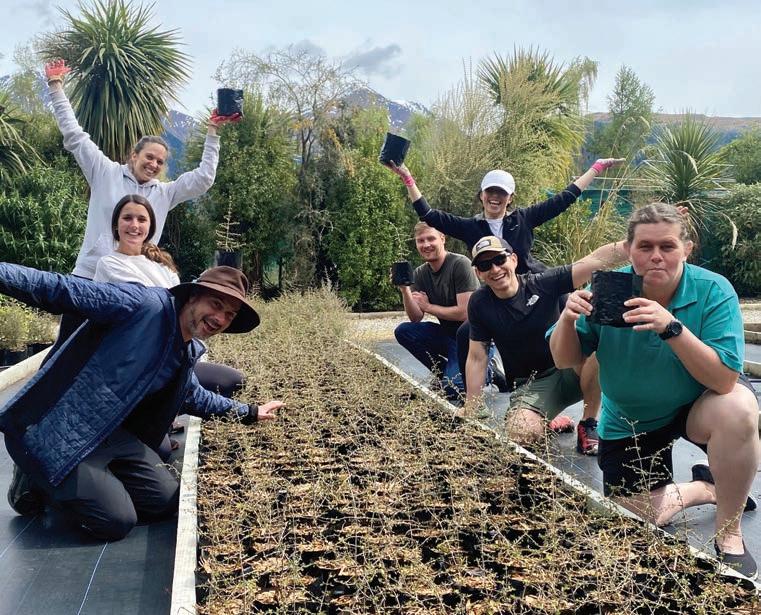

Hilton Queenstown operates a large food waste dehydrator on site. All hotel food waste is broken down by the machine and passionate local environmentalist Michael Sly (Wilding & Co) regularly collects it, at no charge. Sly then turns the waste into compost and supplies that to reforestation projects, such as the Whakatipu Reforestation Trust.
“We’ve changed all our lighting from halogen to LED bulbs, and all our soap bottles in the hotel are recycled back to Beyond Skin Deep – an NZ company, which breaks them down and makes plastic posts for agricultural and horticultural use.”
Where possible, the hotel continues to seek out environmentally friendly suppliers.
“We continue in our ongoing e orts to improve,” says Oei, “But we will keep striving for ways to cut our environmental footprint in half, double our social impact, and lead the change in Queenstown’s sustainable revolution.”
Queenstown general manager Chris Ehmann. Working with a company called ClimeCo the hotel uses a proprietary management system (a type of so ware) to keep track of and measure the energy, carbon, water and waste output from the meetings.
“ e system allows us to calculate our environmental footprint, and together with ClimeCo, we o set carbon,” says Ehmann. “Any client that has an event in one of our hotels in our Australasian region – New Zealand, Australia, Fiji, or Port Moresby, we will o set their carbon footprint.”
Queenstown is the rst Hilton hotel in the Australasian region to o set carbon for all meetings and events, with the others following suit in the next few months.
So far the idea has been warmly received, and for those who aren’t familiar with carbon emissions, Ehmann says the Hilton team is working hard to educate them.
“When businesses or individuals ring to book a meeting we inform them that we are o setting their meeting. ey may be unaware, but it’s our
March 2023 | Issue 27 LAKES BUSINESS
(L to R) Aabhimanyu Sekhar, Katharina Hoock, Kate Gilbert, Frederic Monnier (Director of Operations), Mark Dempster, Chris Ehmann (General Manager) getting their hands dirty with the Whakatipu Reforestation Trust
(L to R) Frederic Monnier, Kate Gilbert, Katharina Hoock, Mark Dempster, Kathleen Oei, Franco Cornejo, Natalie Urbani getting their hands dirty with the Whakatipu Reforestation Trust
5 minutes with Sherwood’s Hayley Scott
 by Jess Allen
by Jess Allen
Since opening its doors, the team behind Sherwood Hotel on Frankton Road have shown a strong commitment to sustainability. ey refurbished the mock-Tudor hotel about eight years ago, salvaging and repurposing what they could and using the lowestimpact materials they could nd, and they’ve continued with this ethos.
Other steps Sherwood have taken include eliminating most singleuse plastics and using solar electricity. Over the years, they’ve developed some great methods that could help meet the goals of the Queenstown Lakes Regenerative Tourism Plan. General Manager of Food & Beverage, and Operations, Hayley Scott, believes the plan is good for the region and that we can all start by doing small things consistently.
“A lot of it is really hands-on, like sorting the rubbish – we’ve got over 78 rooms and waste is brought onsite by guests, so we have the di erent recycling bins in every room – the housekeeping team make sure that everything is in the correct bin. All of the organic waste goes into our composting system and we have a fulltime horticulturalist that spends time turning the compost. All of the organic waste out of the restaurant goes back into the compost as well, which goes to feed the garden that grows veggies for the restaurant,” says Scott.
Sta at Sherwood are on board, too, and share the same positive values. e team are encouraged and empowered to come up with initiatives that support the goal. An example of this is when it was suggested that they stop throwing away half-used toilet rolls, another was to focus on sourcing locally.
“ e restaurant and F and B is probably the most visual example of what we do in terms of trying to source as locally as possible. Using only what’s in season and grown here – over 80% of everything used on our menu is from the South Island.
“It seems overwhelming because it is an ambitious goal and it’s kind of like ‘oh my gosh, where do we start?’ but it is actually just making a start. You’re not going to be perfect right away, so just choosing a couple of things that you can do consistently – that’s what’s eventually going to make a change.”
March 2023 | Issue 27 SOUTHERN LAKES BUSINESS MONTHLY
Accommodation
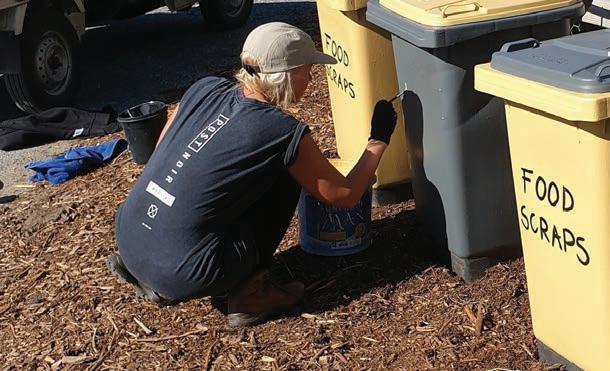

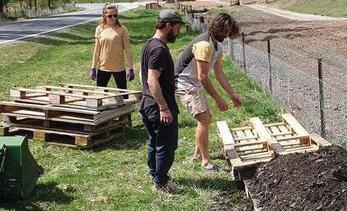


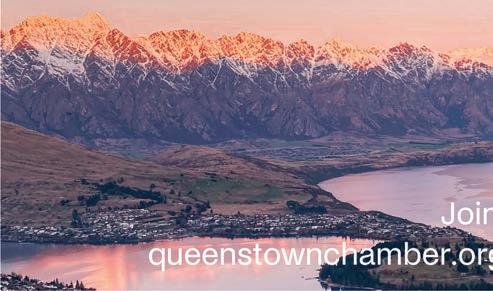


BUSINESS
LAKES
Images: Michael Sly Carbon Tracing Tech
Local environmentalist driving change
 by Sue Fea
by Sue Fea
Passionate Whakatipu environmentalist
Michael Sly is working with US interests to devise a system to legitimise, trace and track, every tree that’s planted as a carbon o set.
Sly co-founded local company Wilding & Co, which extracts wilding pine oil and exports it to the US for the domestic and natural health markets. He’s now working with overseas technology companies on a way to track carbon credits and o sets.
Using blockchain technology, similar to that used for cryptocurrencies, every carbon credit could be logged into a digital system so there’s an element of trust, ensuring any forests planted actually exist, explains Sly.
“As a business, you’ll know where your tree is planted and that it didn’t die.
“Blockchain and cryptocurrencies have become part of our world and we’re looking at how we can generate ecological positivity from this virtual world using a similar system.”
Sly says he’d love to see any carbon o set localised so that the credits purchased are used locally in native reforestation projects to improve our soils, rather than somewhere o shore.
“We have thousands of hectares of state highway road margins, 10 to 20 meters wide in places that could be planted out in beautiful ecological corridors around the country,” he says.
“I’ve noticed on those verges – where agricultural practices aren’t allowed, all sorts of rare plants are growing that you won’t see until you reach remote conservation areas.
“Daniel Sweeney from Whakatipu Reforestation Trust has already suggested that the embankments beneath the Lower Shotover Bridge could be planted in alpine hebes, or similar. en we have carbon o setting in our local network.”
Carbon neutrality will be the next most important issue for Queenstown as a destination, adds Sly.
“Travel will become exponentially bad in 10 years, making people feel morally wrong for travelling from the likes of Europe to NZ because of the impact on the environment. We’re 10 to 15 years behind Europe and when there’s that
Protecting our resources
kind of pressure it’s going to be hard to convince people to y to us.
“If carbon taxes are imposed ying will become extremely expensive too, putting visitors o .” Sly also has a lot of ideas around waste reduction and is voluntarily working with local businesses to help drive the change that’s needed, particularly when it comes to food waste. He provides dropo points for dehydrated organic waste, composts it and then uses the compost on local native forests.
He’d like to see businesses and organisations get more support in their waste reduction e orts –and to be recognised for their e orts.
Local volunteer help agency Baskets of Blessing is under-celebrated for its work in repurposing excess food waste, as is Kiwi Harvest, he says. “ ese people do such an amazing job and are a fundamental part of our tourism society,” says Sly, who’d like to see Baskets of Blessing receive grant funding from the government’s Tourism Recovery programme.
“We need to highlight the work being done locally so our tourists see it. Cafes donating food to Kiwi Harvest should have a sign at the counter informing customers that’s what they do.”

Single-use packaging and recycling are also important issues for Sly, who says there’s no such thing as ‘soulful single-use packaging’. So-called compostable packaging is misleading and of no bene t to our soils and recycling isn’t a true waste-reduction solution.
Sly wants to see all single-use packaging, like co ee cups, with no branding or colour so people get out of the habit of using them. He quotes an example of a lm shoot a few years ago locally where one of the crew had great intentions, recycling all their co ee cups.
“I collected the equivalent of a Toyota Hiluxsized giant plastic bag, containing maybe 10,000 single-use co ee cups. If they’d all had keep cups that would’ve saved 10,000 single-use cups.”
“Recycling is just down-cycling. e second use is not as good and it can become a contaminant down the line.”

Wai Wānaka is working hard to foster behaviour change and enduring outcomes for the Wānaka region’s environment.
A charitable organisation, Wai Wānaka is all about preserving and protecting our precious water resources for future generations to enjoy, says its partnerships manager, Julie Perry.
“We’re an environmental group working in the sustainability space, looking to work with businesses, landowners and the community to understand environmental impacts,” says Perry.
“We work with experts to help farmers understand and mitigate their carbon emissions.”
Decarbonisation by 2030 is a huge goal but enables conversations around what’s possible she says.
Wai Wānaka, run by a volunteer board, also works on native planting, pest and weed control, biodiversity and water monitoring. E.coli, toxic algae, stormwater runo , invasive pests, land use change and urban growth are all concerns that Wai Wānaka is helping communities tackle.
“Our mission is to ensure our grandchildren enjoy this place as we do,” says Perry. “It will take all of us, working together.”
March 2023 | Issue 27 SOUTHERN LAKES BUSINESS MONTHLY
BUSINESS BITES
Queenstown 25th most-loved
Queenstown has been ranked 25th out of the 100 most-loved destinations in the world by the Tourism Sentiment Index (TSI). We’ve moved up from 44th last year and are the only NZ location to make the list. TSI rank locations based on what people feel – they focus on capturing the sentiment of word-of-mouth and conducted an intensive study of their data – more than 1.6 billion online conversations and content pieces that are publicly available on 21,330 global destinations.
B Corp
Is B Corp Certi cation a marketing ploy? You may have heard the term ‘B Corp’ thrown around and wondered if it’s just another greenwashing farce. In the past few years, the movement has gained popularity in Aotearoa and there are now more than 85 businesses with the elusive title.
e certi cation is available to organisations that meet a high standard of performance, accountability and transparency – it encourages businesses to bene t people, local communities and the environment. It’s administered by B Lab, which was founded in 2006 and believes in doing well by doing good. B Lab creates the standards, policies, tools and programmes that they believe will shi the behaviour, culture and structural underpinnings of capitalism.
To become a B Corp, a company must prove, and maintain, high social and environmental performance and have a corporate governance structure that is accountable to all stakeholders, not just shareholders. Transparency is an important part of the process and each company’s performance is publicly available on B Lab’s website.
To get certi ed, a business needs to score at least 80 out of 200 and they must get recerti ed every three years – so businesses need to stay on top of their values or they’ll lose their certi cation. It’s no easy feat, either. B Lab says most businesses start with a score of 50 or lower.
EQSTRUC opens QT office
EQSTRUC Structural Engineers have opened a new o ce in Queenstown. Working on commercial buildings, structural designs for machinery, single houses and multi-unit residential projects, the business felt it was important to open an o ce here to better meet the demands of clients in the Central Lakes region. EQSTRUC’s structural engineering services span new builds, earthquake strengthening, re engineering, and renovations. ey’ve seen some signi cant growth in the region and are excited to have the opportunity to be part of it.
Advertise in Lakes Business
Contact 03 409 2800 | info@qmg.co.nz
Catherine Mercer - Account Manager | 027 777 2785 | cat@qmg.co.nz
Kylee Evans - Account Manager | 021 044 2968 | kylee@qmg.co.nz
David Gibbs - General Manager | 021 514 072 | davidgibbs@qmg.co.nz
Minimum wage rise

Prime Minister Chris Hipkins has announced that the minimum wage will increase by $1.50 per hour – the new hourly rate will be $22.70. e increase will come into e ect on 1 April 2023. We’ve already seen many businesses around Queenstown paying well above the minimum wage. However, for those that aren’t, this will o er a small amount of muchneeded relief for their sta as the cost of living continues to rise. It’s unlikely that the increase will cause any complications when it comes to the Government’s uphill battle to get in ation under control.
Ngai Tahu opposing Remarkables ski area upgrade
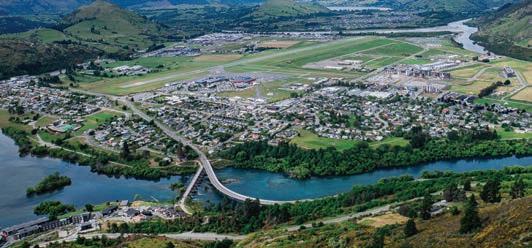
Te Rūnanga o Ngāi Tahu is opposing NZ Ski’s proposal for a chairli upgrade over Shadow Basin and to receive a 40-year concession to continue to operate the Remarkables Ski Area. e new chairli is set to be longer and signi cantly faster than the existing one. e iwi is concerned that a 40-year concession was a long period of time and it would result in another generation not being able to connect with the mountain range.
NZ Ski wants the extended term as an opportunity to recoup the proposed project’s costs. It’s understood that NZ Ski also wants to apply for a 230m tunnel through the mountain, which would more than double the skiable terrain – they believe that capacity for the ski eld will be hit within the next ve years. In total, ve other parties also opposed the proposal, while 16 were in support and two were neutral.
Jacks Point trophy site on the market
A large plot of land at Jacks Point has been put on the market and is donning the title of trophy development land. e Lodge Road block is more than 24 hectares, which is larger than Queenstown’s CBD – it’s expected to fetch more than $40 million. e elevated site sits above Jacks Point – it’s in a north-facing position and boasts views across Lake Whakatipu and the Remarkables. e land can be developed and part of it is reserved for commercial businesses such as restaurants, visitor accommodation and associated activities. Tenders close at midday on Tuesday 28 March.
Advertising Deadlines
Sponsored
March 2023 | Issue 27 LAKES BUSINESS
Content: 12noon Tuesday Display Advertising: 12noon Thursday Queenstown Media Group 2nd Floor, The Mountaineer Building Cnr Beach and Rees Street PO Box 1546, Queenstown 9300
Updates from Ignite Wānaka Chamber of Commerce
Ignite Wānaka Chamber of Commerce’s newly appointed general manager Glenn Peat shares what professionally led him to this new role and his vision of how the board can further support the Upper Clutha business community in 2023
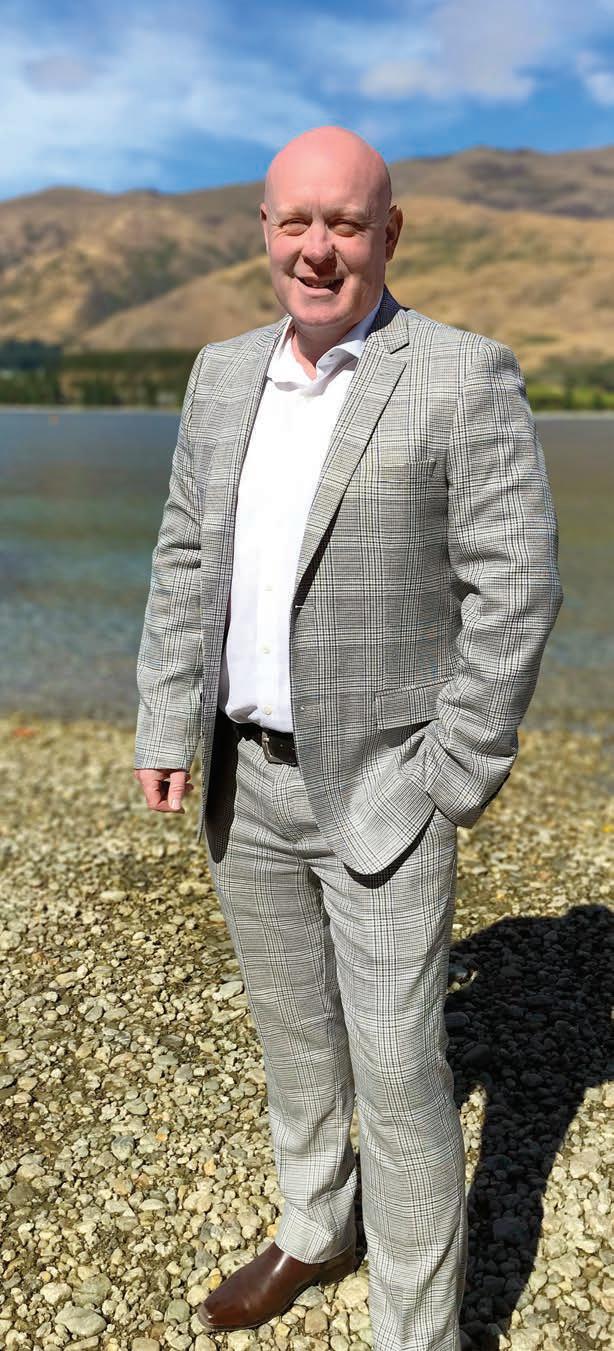
I am excited to join the team at Ignite Wānaka Chamber of Commerce, especially as we enter the new nancial year at the end of this month. For those I have yet to meet, a quick snapshot of my own career, I come as a 30-year veteran of the hospitality industry with considerable international experience leading premium hotel brands including Hyatt Hotels & Resorts, Shangri-La and Hard Rock Hotels International. My career also involved launching hospitality brands in challenging markets and developing business opportunities. Returning to New Zealand in 2018, I took on the role of Chief Operating O cer at GotoCollection, followed by Group General Manager for Taco Medic International a role I plan to continue alongside the GM role at Ignite Wānaka.
I’m passionate the power in engaging, networking and creating positive change, a passion I believe will contribute positively to the Wānaka business community. Ignite Wānaka has an incredible amount to o er its membership. Alongside the membership, I aim to create a wealth of opportunities for Ignite Wānaka to grow and thrive for the bene t of everyone.
A successful chamber always starts with strong leadership and a wellplanned and balanced, yet exible strategy along with the successful execution of events and most importantly the engagement of its members.
For 2023, I plan to help the board achieve:
1. A strengthened sense of community in our networks
2. E ective advocacy for local business: Being engaged in current a airs and the business community within the region and nationally
3. Provide opportunities for networking, education and events to ultimately stimulate growth
4. An understanding of what members want, what works and to focus these for the year ahead
At Ignite Wānaka Chamber of Commerce, we have been working hard to raise the pro le of our business community. Advocacy remains at the forefront of what we are striving to achieve and ensuring that we get a seat at the table. We have had some early success with meetings held with the Auckland Chamber of Commerce recently where I met with Simon Bridges and Michael Barnett, both of whom are strong supporters of business here in Wānaka.
Key advocacy work we are currently engaged with to support the business community includes immigration, employment, fair pay agreements and compulsory income insurance which are challenging local businesses and I intend to raise Wānaka’s concerns and advocate heavily so our challenges are heard and understood. As I am just getting my feet under the table some aspects will take time however advocacy is a top priority. We are also undertaking a collaboration with the Queenstown Chamber and Business South across some events and the opportunities in having a joint voice for the southern part of the South Island, which doesn’t mean Wānaka will lose its identity, it is ensuring that we are appropriately resourced to support Wānaka’s local businesses.
I am enthusiastic about 2023 and the opportunities in representing Wānaka’s business community. is year will bring challenges and also successes and I am excited to join the team and look forward to working with Wānaka businesses.
March 2023 | Issue 27 SOUTHERN LAKES BUSINESS MONTHLY
Peat shares what professionally led him to this new role. Image: supplied.
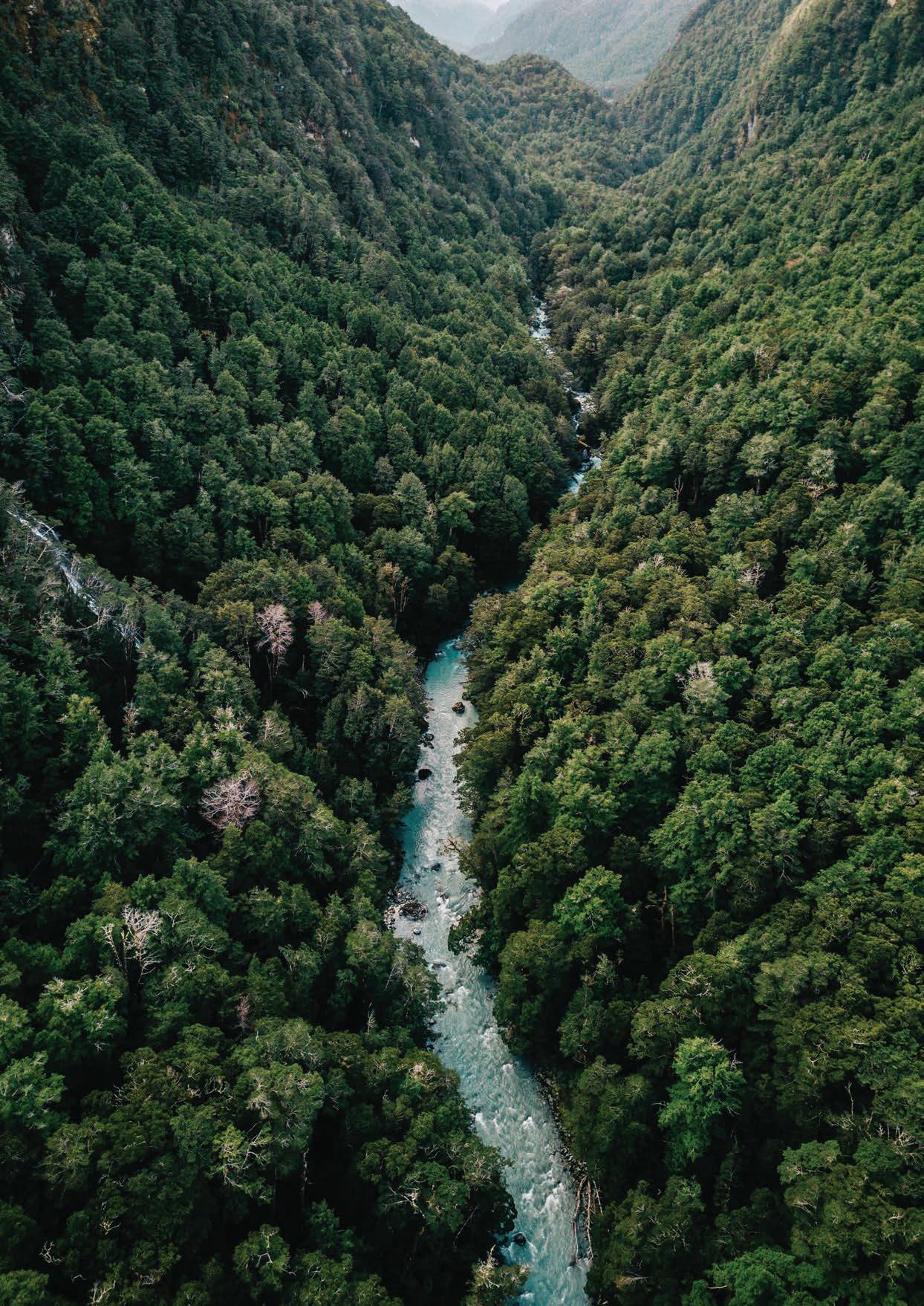 Photo by Josh Withers
Photo by Josh Withers
































































 by Jess Allen
by Jess Allen














 by Jess Allen
by Jess Allen








 by Sue Fea
by Sue Fea





 Photo by Josh Withers
Photo by Josh Withers